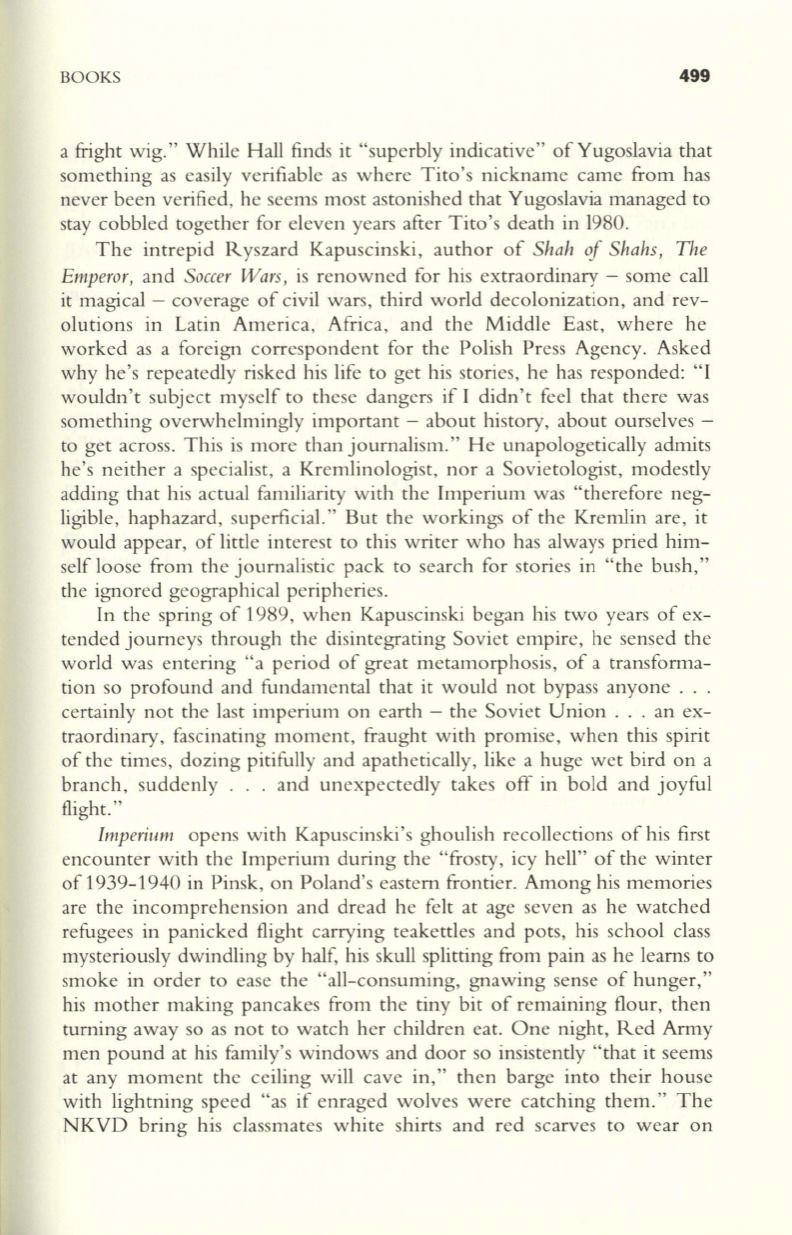
BOOKS
499
a fright wig." While Hall finds it "superbly indicative" of Yugoslavia that
something as easily verifiable as where Tito's nickname came from has
never been verified, he seems most astonished that Yugoslavia managed to
stay cobbled together for eleven years after Tito's death in 1980.
The intrepid Ryszard Kapuscinski, author of
Shah of Shahs, The
Emperor,
and
Soccer Wars,
is renowned for his extraordinary - some call
it magical - coverage of civil wars, third world decolonization, and rev–
olutions in Latin America, Africa, and the Middle East, where he
worked as a foreign correspondent for the Polish Press Agency. Asked
why he's repeatedly risked his life to get his stories, he has responded: "I
wouldn't subject myself to these dangers if
r
didn't feel that there was
something overwhelmingly important - about history, about ourselves -
to get across. This is more than journalism." He unapologetically admits
he's neither a specialist, a Kremlinologist, nor a Sovietologist, modestly
adding that his actual familiarity with the Imperium was "therefore neg–
ligible, haphazard, superficial." But the workings of the Kremlin are, it
would appear, of little interest to this writer who has always pried him–
self loose from the journalistic pack to search for stories in "the bush,"
the ignored geographical peripheries.
In the spring of 1989, when Kapuscinski began his two years of ex–
tended journeys through the disintegrating Soviet empire, he sensed the
world was entering "a period of great metamorphosis, of a transforma–
tion so profound and fundamental that it would not bypass anyone ...
certainly not the last imperium on earth - the Soviet Union ... an ex–
traordinary, fascinating moment, fraught with promise, when this spirit
of the times, dozing pitifully and apathetically, like a huge wet bird on a
branch, suddenly ... and unexpectedly takes off in bold and joyful
flight. "
Imperium
opens with Kapuscinski's ghoulish recollections of his first
encounter with the Imperium during the "frosty, icy hell" of the winter
of 1939-1940 in Pinsk, on Poland's eastern frontier. Among his memories
are the incomprehension and dread he felt at age seven as he watched
refugees in panicked flight carrying teakettles and pots, his school class
mysteriously dwindling by half, his skull splitting from pain as he learns to
smoke in order to ease the "all-consuming, gnawing sense of hunger,"
his mother making pancakes from the tiny bit of remaining flour, then
turning away so as not to watch her children eat. One night, Red Army
men pound at his family's windows and door so insistently "that it seems
at any moment the ceiling will cave in," then barge into their house
with lightning speed "as if enraged wolves were catching them." The
NKVD bring his classmates white shirts and red scarves to wear on


